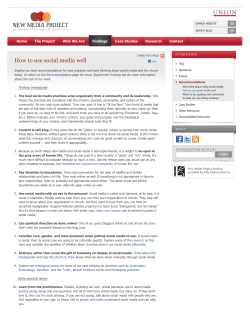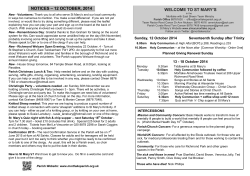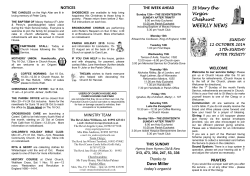
Monday, Nov. 10, 2014 h,
Monday, Nov. 10, 2014 CONTACT: Audrey J. Krumbach, akrumbach@gcsrw.org CLERGY FAMILY CARE SUMMIT ISSUES RECOMMENDATIONS Over a weekend in Chicago, The United Methodist Church gathered church and family experts to discuss issues facing clergy and their families and to recommend ways the church can help improve their lives. Twenty-three clergy, spouses, adult children of clergy, and general agency staff met Oct. 24-25 to examine the changing expectations, emerging stresses and ways churches do and do not support clergy families. The Clergy Family Care Summit was convened by an interagency task force led by the General Commission on the Status and Role of Women. Throughout the summit, participants emphasized that healthy clergy families underpin effective pastoral leadership – one of the drivers of vital congregations. This link was important to participants as they developed recommendations to alleviate specific concerns. Row (left to right) HiRho Park, Mackie Norris, Bill Taylor, Tom Mattick, Most were familiar with Back Bishop Sally Dyck, Trip Lowery, Mary Lawder, Roxanne Taylor, Amy Johnson, with tensions that arise Giovanni Arroyo, Anne Borish. Front Row (from left): Lauren Arieux, Tanya around expectations Eustace, Daniel Cho, Rachel Birkhahn-Rommelfanger, Hyemin Na. Not pictured: Amy Valdez Barker, Becky Posey Williams, Mark Biddle, Jane Ives, Charles that a pastor’s spouse Reynolds, Monalisa Tuitahi and Audrey Krumbach. will lead in the congregation or participate in the same activities of previous pastor’s spouses; the frequent moving and transition that comes with UMC pastorship; high expectations of clergy kids; and various parsonage or other housing situations. Some emerging concerns were brought forth as well: The need for mental health care and support for clergy and families, two-clergy or commuter marriages, struggles of racial/ethnic clergy families, cross-cultural appointments, and lack of physical health. --more-- Page |2 Bishop Sally Dyck of the Northern Illinois Conference shared information about her conference’s annual transitional workshops for churches and clergy with new appointments, and encouraged all to practice creative empathy. She suggested that local church Staff Parish Relations Committees (SPRCs) put themselves in the position of the family who is moving to help anticipate needs of the entire family settling into a new home and community in addition to all that the pastor experiences in a new church setting. As the task force continues its work, it offers these recommendations for consideration: For Annual Conferences, Bishops and Cabinets: Have bishops and cabinets or other supporting groups host or attend listening groups for clergy families to identify their experiences of expectations, blessings, stresses and support. Support of mental health initiatives by conferences publically and financially thereby reducing clergy stigma through normalizing the presence of mental health care in church settings. Provide periodic mental health care screenings at district and conference meetings for clergy and their entire family. Use events, retreats, covenant groups, and social media support groups as important tools for reducing isolation and offering places for the spouse or children of clergy to receive peer support and mentoring. For District Committees and Superintendents: Provide additional resources and training for SPRC members in the areas of clergy family stress and support. Offer transitional workshops prior to and following moves for clergy, families and congregations. Provide support to clergy families through the services of a district nurse, chaplain or counseling service. For Local Congregations and Staff Parish Relations Committees: Discuss openly expectations for the clergy person and their family. Conversations about privacy, church attendance and respecting the individuality of the child or partner of a clergy person can greatly reduce stress in both the family and congregation. Ensure that SPRCs have a “health covenant” with the clergy person to include use of time off, getting an annual physical, having a mental health check, and taking time for spiritual practices. Train all churches who receive a cross-cultural appointment to help the congregation understand, accept, and welcome the family of their new clergy person. --more— Page |3 The Clergy Family Care Task Force and leaders from the summit will develop the following resources for local congregations and clergy families: Tip sheets of best practices in supporting clergy families; specific recommendations to support clergy families in cross-cultural appointments; and a website to facilitate networking among the families of clergy persons and to share books, materials, practices, and events that promote healthy clergy families. The Clergy Family Care Summit was convened by an interagency task force that includes the General Commission on the Status and Role of Women, the General Board of Discipleship, the General Board of Pension and Health Benefits, the General Board of Higher Education and Ministry, the General Council on Finance and Administration, and the General Commission on Religion and Race. The 2012 General Conference called for this summit in order to “research issues affecting clergy spouses and families, to identify and promote existing relevant and effective resources, plan the development of needed additional resources to address those concerns and make any legislation recommendations to the 2016 General Conference” (BOR #2023). -30-
© Copyright 2025













